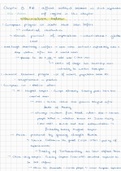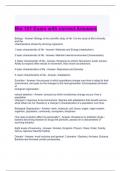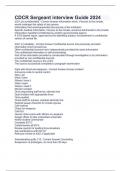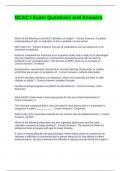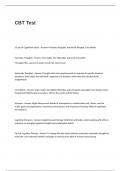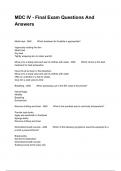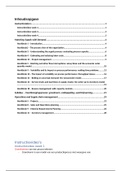—————————————————————————————————————————
Indy Faassen
§2.1 Ontledings- en synthesereacties
Een ontledingsreactie is een reactie waarbij uit één beginstof twee of meer reactieproducten ontstaan. Het vindt
plaats op drie manieren: thermolyse, elektrolyse en fotolyse.
Thermolyse
Thermolyse is een ontledingsreactie door middel van warmte. Als je papier of suiker zonder zuurstof verhit,
ontleedt het en hou je een zwarte stof over. Als je hout, rubber of plastic zonder zuurstof verhit, ontstaat koolstof
als reactieproduct. Stoffen die bij verhitten zonder zuurstof verkolen, heten organische stoffen.
Reactieschema: organische stoffen —warmte——> koolstof + water + rook + gassen
Elektrolyse
Elektrolyse is een ontledingsreactie door middel van elektrische energie.
Reactieschema: water —elektrische energie———> waterstof + zuurstof
Waterstof heeft een kleinere dichtheid dan lucht, is het lichtste gas en erg brandbaar. Een dergelijke reactie
waarmee je de aanwezigheid van een stof aantoont, noem je een aantoningsreactie. Als je waterstof aansteekt
reageert het met zuurstof uit de lucht. Hierbij ontstaat water en komt energie vrij. Zuurstof is nodig om stoffen te
laten branden. In een zuivere stof gaan verbrandingen sneller en feller dan in de lucht.
✰ Aantoningsreactie waterstof: opvangen in een reageerbuis / vlam erbij /blaffend geluid
✰ Aantoningsreactie zuurstof: opvangen in een reageerbuis / vlam erbij / gloeiende houtspaander
Reactieschema: waterstof + zuurstof —aansteken—-> water
Fotolyse
Fotolyse is een ontledingsreactie door middel van licht. Als je deze stof ontleedt ontstaan water en zuurstof. Als
ontleding door licht ongewenst is, moet je de stoffen in het donker bewaren.
Reactieschema: waterstofperoxide —licht——> water + zuurstof
✰ Verbindingen: ontleedbare stof
✰ Niet-ontleedbare stof (120): elementen
Metalen
Niet-ontleedbare stoffen behoort tot metalen (ongeveer 70). Metalen kunnen reageren met zuurstof. Met het
metaal ijzer heet dit roesten, bij andere metalen heet dit corroderen. Gemeenschappelijk kenmerken: geleiden
warmte en elektrische stroom en glanzend oppervlak. Niet-metalen (ongeveer 50) vertonen weinig of geen
gemeenschappelijke kenmerken.
Synthesereacties
Synthesereacties zijn chemische reacties waarmee nieuwe stoffen en materialen worden gemaakt. Een
synthesereactie is een reactie waarbij een nuttig bruikbare stof ontstaat. Met behulp van reacties kunnen
voedingsstoffen, brandstoffen, medicijnen, metalen, kunststoffen en meer materialen worden gemaakt.
Een belangrijke synthesereactie is de fotosynthese die plaatsvindt in groene planten onder invloed van (zon)licht.
Het zorgt ervoor dat er voldoende voedsel en zuurstof op aarde is.
Reactieschema: koolstofdioxide + water —(zon)licht——> glucose + zuurstof
§2.1 Moleculen en atomen
De vier belangrijkste kenmerken (uitgangspunten) van het deeltjesmodel:
● Elke stof bestaat uit heel kleine deeltjes: moleculen.
Indy Faassen
§2.1 Ontledings- en synthesereacties
Een ontledingsreactie is een reactie waarbij uit één beginstof twee of meer reactieproducten ontstaan. Het vindt
plaats op drie manieren: thermolyse, elektrolyse en fotolyse.
Thermolyse
Thermolyse is een ontledingsreactie door middel van warmte. Als je papier of suiker zonder zuurstof verhit,
ontleedt het en hou je een zwarte stof over. Als je hout, rubber of plastic zonder zuurstof verhit, ontstaat koolstof
als reactieproduct. Stoffen die bij verhitten zonder zuurstof verkolen, heten organische stoffen.
Reactieschema: organische stoffen —warmte——> koolstof + water + rook + gassen
Elektrolyse
Elektrolyse is een ontledingsreactie door middel van elektrische energie.
Reactieschema: water —elektrische energie———> waterstof + zuurstof
Waterstof heeft een kleinere dichtheid dan lucht, is het lichtste gas en erg brandbaar. Een dergelijke reactie
waarmee je de aanwezigheid van een stof aantoont, noem je een aantoningsreactie. Als je waterstof aansteekt
reageert het met zuurstof uit de lucht. Hierbij ontstaat water en komt energie vrij. Zuurstof is nodig om stoffen te
laten branden. In een zuivere stof gaan verbrandingen sneller en feller dan in de lucht.
✰ Aantoningsreactie waterstof: opvangen in een reageerbuis / vlam erbij /blaffend geluid
✰ Aantoningsreactie zuurstof: opvangen in een reageerbuis / vlam erbij / gloeiende houtspaander
Reactieschema: waterstof + zuurstof —aansteken—-> water
Fotolyse
Fotolyse is een ontledingsreactie door middel van licht. Als je deze stof ontleedt ontstaan water en zuurstof. Als
ontleding door licht ongewenst is, moet je de stoffen in het donker bewaren.
Reactieschema: waterstofperoxide —licht——> water + zuurstof
✰ Verbindingen: ontleedbare stof
✰ Niet-ontleedbare stof (120): elementen
Metalen
Niet-ontleedbare stoffen behoort tot metalen (ongeveer 70). Metalen kunnen reageren met zuurstof. Met het
metaal ijzer heet dit roesten, bij andere metalen heet dit corroderen. Gemeenschappelijk kenmerken: geleiden
warmte en elektrische stroom en glanzend oppervlak. Niet-metalen (ongeveer 50) vertonen weinig of geen
gemeenschappelijke kenmerken.
Synthesereacties
Synthesereacties zijn chemische reacties waarmee nieuwe stoffen en materialen worden gemaakt. Een
synthesereactie is een reactie waarbij een nuttig bruikbare stof ontstaat. Met behulp van reacties kunnen
voedingsstoffen, brandstoffen, medicijnen, metalen, kunststoffen en meer materialen worden gemaakt.
Een belangrijke synthesereactie is de fotosynthese die plaatsvindt in groene planten onder invloed van (zon)licht.
Het zorgt ervoor dat er voldoende voedsel en zuurstof op aarde is.
Reactieschema: koolstofdioxide + water —(zon)licht——> glucose + zuurstof
§2.1 Moleculen en atomen
De vier belangrijkste kenmerken (uitgangspunten) van het deeltjesmodel:
● Elke stof bestaat uit heel kleine deeltjes: moleculen.

